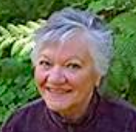"Early in my healing practice," Joyce Wilkes Hawkes writes, "I thought my job was to meditate, fill myself with healing energy, and blast my client with it—to the best of my ability. On rare occasions, the outcome dazzled: sudden reversals of arthritis, shriveled cancers. More often than not, the results did not reflect the endeavor. Some clients even became nauseated.
"Puzzled by these inconsistent results, I sought answers. I discovered that people who had already done a considerable amount of spiritual or meditative practice were able to receive and utilize a substantial flow of energy. Those who were just starting to meditate and awaken spiritually, or who were just beginning some other form of complementary healing, had the most difficulty. Seeking the advice of a wise Chinese physician and acupuncturist, I learned about the concept of blockage, which is so thoroughly understood in this tradition. Energy blockage prevents healing, no matter how much energy is available. This new awareness helped me to understand the variable results I was seeing in my healing practice.
"I realized that in addition to sharing healing energy with my clients, I needed to find out more specifically where the energy blockages were and clear them. The more specifically I could locate them, the better the healing.
"I began using a pendulum, which would begin to spin when I held it above the blocked area. I found this method to be generally reliable. Soon, I was able to sense the blocked places with my hands. A cold wind or excess heat would come from the sites of disease or former injury. Sometimes, I could see the blockage with my eyes, or I might have an uncanny sense of knowing where the problem originated.
"Not all blockages are easy to clear. Energy obstructions can be especially tenacious when a belief system has locked them into place. Jocelyn’s case illustrates a limiting belief system that obstructed her from healing. Her case in not unusual. I have heard hundreds of similar stories.
"Tears poured down Jocelyn’s face as she walked from my reception area into the office. She slumped onto the comfy couch, clutched the sky-blue chenille decorative cushion, and launched immediately into her concerns. ‘I was diagnosed with breast cancer a month ago, and I had surgery three weeks ago. The doctor found a very aggressive tumor. I’m scheduled to start chemotherapy the end of this week. I read that I need to find the cause of the cancer before I can heal. I don’t know where to look. My brother abused me when I was sixteen. I was terribly mean to my kid sister after that. Am I being punished? What did I do to cause my cancer?’
"Certainly many factors can contribute to illness, including emotional trauma, genetic predisposition, and environmental toxic exposure. We tend to extrapolate backwards, however, from the disease to a simplistic cause, particularly one that points the finger of blame toward others or guilt toward ourselves.
"Jocelyn’s generally intense emotions and all-consuming guilty thoughts contributed to her state of phenomenal stress. The serious effects of stress included depression of the immune system and reduced nerve regeneration (neurogenesis), both of which can block the healing of the body.
"Although the cause of Jocelyn’s cancer was unknown, her stress clearly undermined her well-being and blocked her recovery. Confused and upset by surgery, chemotherapy, and other treatments, it took all her courage just to face each day. We needed to help her fin tools to reduce her stress. We used imagery of Jocelyn walking along her favorite stretch of beach listening to the crashing waves, smelling the fresh salt air, and feeling the warmth of sun on her shoulders. We continued using imagery that she could initiate and change whenever she needed to make the process uniquely her own. She not only found peace of mind but eventually resolved her feelings of guilt and let go of her suspicion that she was being taught a lesson for having done something wrong.
"Months after she had completed her course of medical treatment—and her formerly bald head sported a vigorous cap of new, fuzzy growth—we looked back on the intrusion of cancer and what she learned from the experience. ‘I have new insights about my life,’ she said. ‘I’m a good person with gifts that help others. I count to a lot of people. All the ‘things’ I’ve accumulated mean much less to me now. Material possessions are no longer an important goal. My priorities have changed, and I am happy and free to enjoy my life and my loved ones. With your help, I was able to focus on using healing meditations in conjunction with the best possible medical treatment, and I was able to get through my cancer.’
"Jocelyn’s main blockage was the belief that her illness was punishment. Once she was able to clear this limitation, her body responded. She had fewer aftereffects from chemotherapy, less fatigue, and a much increased sense of well-being. Her confidence that she actually had a good future increased, too. The outcome of her illness included physical healing plus a new level of wisdom about herself and her life. Beliefs are powerful tools that can limit us, but they can also be used to propel us into life-giving freedom."
Joyce Whiteley Hawkes, Cell-Level Healing: The Bridge from Soul to Cell (Atria Paperback, 2006).










